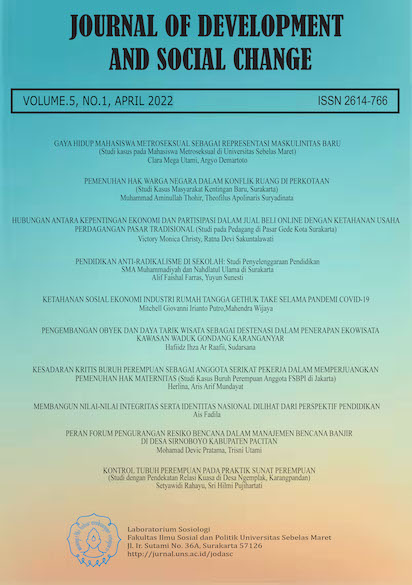STUDI DIFUSI DAN ADOPSI INOVASI DALAM LAYANAN “MBELA WONG CILIK” UNIT PELAYANAN TERPADU PENANGGULANGAN KEMISKINAN (UPTPK) DI KABUPATEN SRAGEN
Abstract
Abstract: This study explained how the diffusion process “Mbela Wong Cilik” service innovation in UPTPK of Sragen Regency and adoption by the poor people in that area. In addition, it also aimed to find out the supporting and inhibiting factors affecting the process of diffusing and adopting this service. This study was a descriptive qualitative research. Case study was used to capture various information using a detailed and nuanced description about the process of diffusing and adopting “Mbela Wong Cilik” service innovation in UPTPK of Sragen Regency. Techniques of collecting data used were in-depth interview, observation, and file documentation supporting the research. Three components of data analysis were used: data reduction, data display, and conclusion drawing. In addition, to validate the result of research, the data triangulation was used. This research shows that the downstream organization communication channel dominates the diffusion of service innovation in UPTPK to the poor people. The communication is done face to face between UPTPK and subdistrict, Village/Kelurahan and then it is transferred to the community during the community meeting. Here the chief of RT/RW, bayan and community leader as the opinion leader play important roles in smoothing the innovation diffusion process to the public. The other communication channels are group communication and mass media. In this research, there are five adopter categories: innovator, early adopters, early majority, late majority, and laggards. The factors smoothing the diffusion are UPTPK services are compatibel with social economic condition of poor people, communication of behavior, and the characteristics of society who are open with innovation and opinion leader roles. Meanwhile, the inhibiting factors are ineffectively use of mass media, education, lack of roles the society communicating innovations to others, and information bias occurring frequently.
Keywords : diffusion, adoption, adopter categories
Abstrak: Penelitian ini menjelaskan bagaimana proses pendifusian inovasi layanan Mbela Wong Cilik UPTPK Kabupaten Sragen dan proses pengadopsian oleh masyarakat berkriteria miskin di wilayah tersebut. Selain itu, juga mengetahui faktor pendorong dan faktor penghambat yang mempengaruhi proses difusi dan adopsi layanan ini. Jenis penelitian adalah deskriptif kualitatif. Studi kasus digunakan untuk menangkap berbagai informasi dengan deskripsi yang teliti dan penuh nuansa dari proses difusi dan adopsi inovasi Layanan “Mbela Wong Cilik” UPTPK Kabupaten Sragen. Teknik pengumpulan data dilakukan melalui wawancara mendalam, observasi, dan dokumentasi arsip yang menunjang penelitian. Tiga komponen analisis data digunakan yaitu reduksi data, sajian data, dan penarikan kesimpulan. Selain itu, untuk memantapkan hasil penelitian digunakan trianggulasi data. Dari hasil penelitian, saluran komunikasi organisasi ke bawah mendominasi difusi inovasi layanan UPTPK kepada masyarakat miskin. Komunikasi terjadi secara tatap muka dari UPTPK ke Kecamatan, Desa/Kelurahan dan selanjutnya ditransfer kepada masyarakat saat pertemuan warga. Ketua RT/RW, Bayan dan tokoh masyarakat adalah pemuka pendapat (opinion leader) yang berperan penting memperlancar proses difusi inovasi ke masyarakat. Saluran komunikasi lainnya adalah komunikasi kelompok, dan media massa. Pada penelitian ini terdapat lima kategori adopter, yakni: innovators, early adopters, early majority, late majority, dan laggards. Faktor yang memperlancar difusi yakni layanan UPTPK memenuhi kondisi ekonomi masyarakat miskin, perilaku komunikasi, karakteristik adopter terbuka dengan hal-hal baru dan peran opinion leader. Sedangkan faktor penghambat meliputi tidak efektifnya penggunaan media massa, pendidikan, masyarakat kurang berperan dalam pendifusian inovasi ke anggota sistem sosial, dan sering terjadinya bias informasi dari Desa/Kelurahan kepada masyarakat.
Kata kunci : difusi, adopsi, kategori adopter
Full Text:
PDFDOI: https://doi.org/10.20961/jodasc.v1i2.23060
Refbacks
- There are currently no refbacks.




